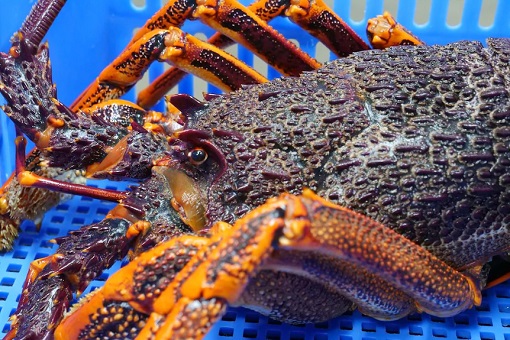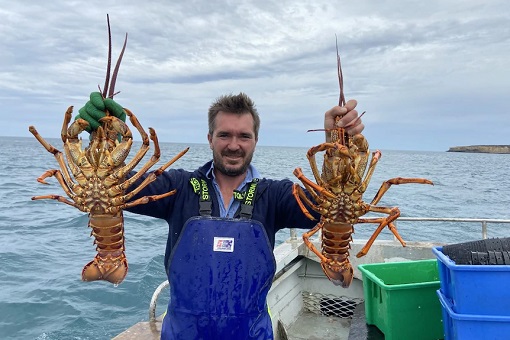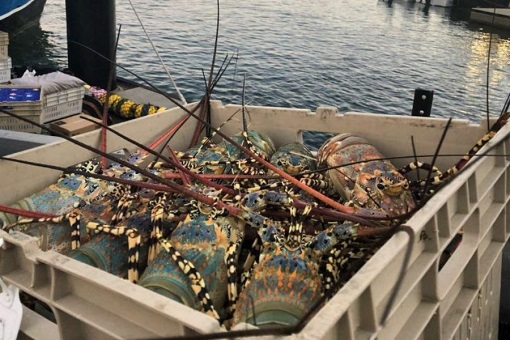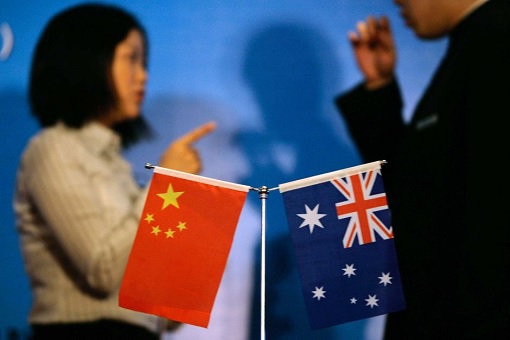When the Chinese government left planeloads of $2 million worth of Australian lobster to rot on a Shanghai tarmac last November, it was a signal that the hostility between both countries could only get worse. The shipments had experienced Customs clearance delays because the Chinese authorities were inspecting 100% of the Australian rock lobsters to trace elements of metals.
Trade Minister Simon Birmingham immediately warned if China continued to discriminate against the Aussie lobsters, or other products for that matter, it would lodge complaints with the WTO (World Trade Organization) or CHAFTA (China–Australia Free Trade Agreement). Agriculture Minister David Littleproud, disappointed, whined that the Chinese should play by WTO rules.
But without an official statement from Beijing, there was little Canberra could do. China has every right to inspect every single lobster for safety reason, even though it would mean tonnes of Australian lobsters would die at Chinese airports. Kyri Toumazos, executive officer of the Northern Zone Rock Lobster Fishery in South Australia, said the product may spoil if inspections were too slow.

To make matters worse, in addition to Customs clearance delays, the authorities had also slapped additional inspections just to make life difficult for both importers and exporters. As a result, the fleet carrying the lobsters was stranded for up to six days. It was so bad that Australian exporters decided to stop sending shipments to China until more information could be gathered.
But to local rock lobster fisherman like Simon Nash, who has nothing to do over China-Australian political dispute, the punishment has a huge impact. And it’s not hard to understand why. Before the trade boycotts, around 95% of the rock lobster catch was being flown live to China. It means only 5% were being consumed by local people.
As insulting as it may sound, Australians could not afford the luxury crustaceans. The Chinese were prepared to pay top dollar – up to A$100 per kilogram – for quality Australian southern rock lobster. After the Chinese market is shut, it would be lucky if Mr Nash can get rid of his lobsters at A$30 per kilo on the domestic market. So, fishermen suffer a sudden plunge in demand as well as a price crash.

However, one man’s loss is another man’s gain. As the country has been awash in local lobsters, many Aussies found themselves purchased live lobsters for the first time. Local fishermen, reluctantly, were selling lobster from half to one-third of the price they were getting in China. Some supermarkets reportedly advertised small lobsters for as little as A$15 each.
The ban could not come at a better time. At Catalano’s Seafood, a lobster wholesaler and retailer in Western Australia, hundreds of people queued up to buy cheap lobster in the days leading up to Christmas last year. People who had never eaten fresh lobsters before started to push their cooking skills to the limit – from making lobster curry to lobster in a grilled cheese sandwich.
In fact, thanks to China, locals have been cooking and eating so much lobster that they are getting sick of it. Still, the industry saw only a small increase in demand over Christmas even after Australians opened their wallets to support local producers. To lobsterman like Simon Nash, the domestic spending paled in comparison to the Chinese export market he had been enjoying for years.

A sudden loss of lucrative Chinese market and a plunge in price of lobster are just some of the problems. There’s something called “license fees”, which can be 20% to 40% of the cost of production. While Western Australia deferred license and boat registration fees for 12 months and Tasmania refunded A$3.5 million in licence fees to its producers, the Victorian state government did nothing.
Victorian Rock Lobster Association president Markus Nolle said the southern rock lobster industry is “on its knees” because rock lobster fisherman simply cannot survive without the extraordinary premium prices the Chinese were prepared to pay. While the established players may survive, new entrants caught with high levels of debt could go bankrupt if license fees are not waived.
Under tremendous pressure, the Australian government had decided to allow rock lobster fishers to carry-over uncaught quota and have extended fishing seasons. Essentially, southern zone rock lobster fishers will be granted additional time to catch their quota this year – current season has been extended to 31 July 2021 and the next season will open early on 15 September 2021.

In the same breath, southern zone rock lobster fishers will also be granted the option to carry-over up to 20% of their quota entitlements from this season to the next, if they do not catch all their quota. The flexible arrangements have also been extended to the inner region of the northern zone to provide some relief to the industry.
The huge discounts offered during the Christmas only allowed the lobster fishermen to break even. Hence, everyone understood that the fire sales from the back of the boat are a short-term fix. It’s not rocket science that no amount of domestic demand from a country of 25 million will ever replace the live-seafood appetite of a country of more than 1.4 billion.
In the longer term, Australia’s fishermen hope to resume exports to China, failing which they are looking to get a higher price in markets like Japan, Europe and the United States. The No. 1 priority is still China. South Australian rock lobster exporter Andrew Ferguson recently launched a Chinese social media page on WeChat to reconnect with his long-time Chinese clients.

Ferguson said – “We are all surprised here in Australia that China would ban our lobster. Over the years we made many friends through the Chinese supply chain”. While acknowledging that it will take time, he is willing to go the extra miles to re-engage old (Chinese) markets again due to “amazing Chinese consumption of our product”.
However, according to the Australian agriculture department, the resumption of rock lobster exports to China is the “key uncertainty” for the next 5 -year projections. Even if Beijing miraculously allows the lobsters from the land Down Under to land on Chinese soil, the seafood export will not return to peak levels seen from 2013 to 2019.
And there’s a reason why Australia quit the U.S. and Europe markets and shifted entirely to China in 2015. The Chinese market offered a premium price that no country can match. Canberra should stop thinking that China cannot live without its lobsters. Like its beef industry, other countries, including its allies, have already jumped in to take its place as lobster exporters to China.

As Australia tries to figure out how to replace the massive A$750 million Chinese markets, New Zealand exporters were only too happy to supply their lobsters to China – as much as NZ$100 for each crayfish. California lobster fishermen are also benefiting from the Australian misfortune. Almost all of the lobsters caught in the waters off of Santa Barbara’s coast this season will end up in China.
Seafood distributors Gabriel Sosa said – “The most I’ve paid for lobster in my 20 years as a distributor is US$25 a pound. This year, we’ve seen it go as high as US$40”. From as low as US$8 to US$10 a pound when seafood restaurants closed due to Covid-19, the price of California lobsters suddenly jumped to over US$33 a pound in December, after China banned Australia’s lobsters.
Other Articles That May Interest You …
- Australia’s Beef Export Worth A$3 Billion To China May Not Recover – Permanently & Completely
- Australia’s $1 Billion Wine Industry In Trouble – China Officially Slaps 218.4% Import Duties For 5 Years Effective Sunday
- Australia’s Treasury Wine Forced To Sell Brands & Assets – Profit Suffers 43% Drop After China’s Tariffs Punishment
- China Will Import Coal From Any Country, Except Australia – PM Morrison Upset Over Impact On The A$14 Billion Industry
- Australia Hopes RCEP Will Fix Problems With China – But It Gets Worse As Beijing Reveals Three Issues With Canberra
- Australia’s Economy Being Hit Again – China Bans Wheat, Lobster, Barley, Sugar, Wine, Timber, Coal, Copper
- China Punish Australia Again – Recession-Hit Aussie Saw Its A$2 Billion Cotton Industry Targeted
- Australia Upset! – China Now Uses “Asian Discrimination” To Target Aussie’s A$38 Billion Education Industry
- Coronavirus Inquiry Backfired On Aussie – China Slaps Tariffs, Warns It Has The Power To Hurt Australia Economy
- Lawsuits For Trillions Of Dollars Against China Over Spread Of Coronavirus – Here’s Why It’s A Waste Of Time
- 3 Coronavirus Variants Discovered – Surprisingly, “Type-A” Found In Americans, Wuhan’s Type-B And Type-C In Europe

|
|
April 22nd, 2021 by financetwitter
|


|

|

|

|

|

|




























No worries, mate! – That’s what you should tell them convicts worried sick about what the effect of the toxic snout of their thug PM Morisson has done to goodwill with China. Them Chinese ain’t going to touch Ozzie lobsters fora very long while now – something like forever if Ozland starts threatening China with its pack of wild dingo politicians and two non-existent missiles. Not to forget the non-existent support of Nippon Inc, or the good ole US of À with big mouth but using Australia as its one testicle, ever coming to fight behind Ozland.
Trade is always better than war, especially when you can only talk tough but have precious few convicts willing to fight in an army vastly bigger than a bunch of kid-slaughtering Croc Dundees and Edna Everidges.
But all is not lost. There’s always the kiasu nation to the rescue!
What say lower the price of them rock lobsters to rock bottom?
That would instantly rock with Malaysia’s kiasus who love to pig food as a means of dealing with their genetic anxiety. You always find our kiasus looking longingly even at lobsters that don’t rock. They would salivate uncontrollably and have wet dreams having it off with rock lobsters, however them poor creatures are dressed or not. Throw in two free gifts with every purchase and the deal is sealed! You can think of the free gifts as the wine and the rotten beef China ain’t buying, that plus the wine-turned-vinegar
would work magic with our kiasu like bluebottles get attracted to shiite, Alhamdulilah!
I’ll advise Malaysia’s kiasu population – which is a large market, to help them white convict ex-limeys, lap up the offer of the century – and while the aboriginal patch called Australia lasts as a trading post. Who knows how fast the patch would survive without the grace of their Chinese uncles and aunts…
So, all ye kiasus of the land, forget our lousy copies of wagyu, go talk to your supermarkets, get your lobster-plus orders sorted out, don’t forget your free gifts.
There’s nothing more worthwhile than pigging a delightful last supper as you wait for Covid to get you, or the vaccines to kill you instead. Or, more likely, the incompetent gomen to fcuk up the non-control of the virus – or further mess up the ineffectual vaccination illusion, Ameen.